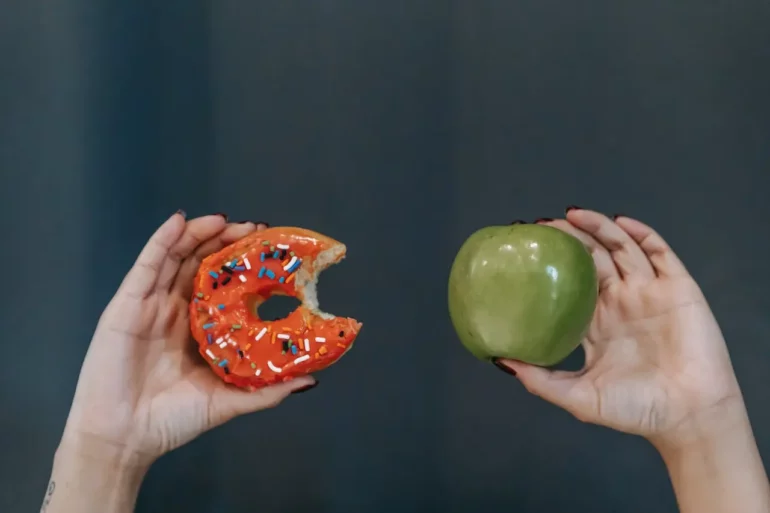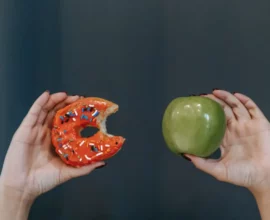The world we live in today is fast-paced and constantly on the move. Convenience is king, and food is no exception. With busy lifestyles and the temptation of fast-food chains and vending machines, it can be difficult to make healthy food choices. But what exactly is the difference between healthy food and junk food, and why does it matter?
In this article, we’ll delve into the world of healthy food and junk food and explore the pros of healthy food and cons of junk food, to help you make informed choices about what you eat.
Healthy Food: The Basics
Healthy food refers to food that is nutritious and provides essential vitamins, minerals, and nutrients to the body. These foods are typically low in unhealthy fats, salt, and sugar and high in fiber, protein, and other important nutrients. Healthy foods include fruits and vegetables, lean meats, whole grains, nuts, and seeds. These foods are important for maintaining a healthy weight, preventing chronic diseases, and promoting overall health and well-being.

A few examples of healthy food are as follows-
- Fruits and Vegetables
Fruits and vegetables are packed with vitamins, minerals, and fiber, and they are low in calories. They also contain antioxidants, which help to protect the body against damage from free radicals. Fruits and vegetables are also good sources of fiber, which helps to keep the digestive system healthy and reduces the risk of constipation. Eating a variety of fruits and vegetables every day is recommended to ensure that you get all the essential nutrients that your body needs.
- Whole Grains
Whole grains are an important part of a healthy diet because they are high in fiber and essential nutrients such as iron, magnesium, and B vitamins. Whole grains help to keep the body fueled and provide energy. In addition, whole grains help to reduce the risk of heart disease and diabetes. Examples of whole grains include brown rice, oatmeal, whole-grain bread, and whole-grain pasta.
- Lean Proteins
Lean proteins are a crucial part of a healthy diet because they help to build and repair tissues in the body. Lean proteins also help to maintain a healthy weight, and they are low in saturated fat and cholesterol. Examples of lean proteins include chicken, fish, turkey, and tofu.
- Healthy Fats
Healthy fats are essential for good health and help to maintain a healthy weight. Healthy fats include monounsaturated and polyunsaturated fats, which are found in foods such as nuts, seeds, olive oil, and avocados. In addition, omega-3 fatty acids, which are found in fatty fish such as salmon and mackerel, are important for heart health.
Pros of Eating Healthy Foods
There are many benefits to eating healthy foods, including:
- Weight Management
Healthy foods are typically low in calories and high in fiber, making them a great choice for weight management. Fiber helps to keep you feeling full for longer, so you are less likely to reach for junk food and snacks in between meals.
- Improved Heart Health
Healthy foods are often low in unhealthy fats, salt, and sugar, which are all factors that can contribute to heart disease. By eating a diet rich in fruits, vegetables, lean meats, and whole grains, you can help to reduce your risk of heart disease.
- Better Brain Function
Healthy foods are also essential for good brain function. The brain requires a range of nutrients, including vitamins, minerals, and essential fatty acids, to perform at its best. Eating a diet rich in these nutrients can help to improve brain function and prevent cognitive decline.
- Stronger Immunity
Eating a diet rich in fruits, vegetables, and other healthy foods can help to boost the immune system and protect against illness and disease. Antioxidants, vitamins, and minerals found in healthy foods are all important for maintaining a strong and healthy immune system.
Junk Food: The Basics
Junk food, on the other hand, is typically high in calories, unhealthy fats, salt, and sugar, and low in essential vitamins, minerals, and nutrients. Junk food includes fast food, processed snacks, and sugary drinks, and is often high in calories, making it a leading cause of obesity and other health problems.

Fast Food
Fast food is a type of junk food that is quick and convenient but often high in calories, fat, sugar, and salt. Fast food is often high in trans fats and sugar, and it is often low in essential nutrients such as vitamins, minerals, and fiber. Fast food is also often high in sodium, which can lead to high blood pressure and an increased risk of heart disease and stroke.
Cons of Eating Junk Foods
The cons of eating junk food are numerous and include:
- Weight Gain
Junk food is typically high in calories, unhealthy fats, and sugar, which can contribute to weight gain and obesity. In addition, the high levels of salt in junk food can cause water retention, leading to weight gain.
- Increased Risk of Chronic Diseases
Junk food is often high in unhealthy fats, salt, and sugar. which can contribute to the development of chronic diseases such as heart disease, type 2 diabetes, and certain cancers.
- Poor Nutrition
Junk food is often low in essential vitamins, minerals, and nutrients, meaning that it provides little nutritional value to the body. This can lead to deficiencies and other health problems over time.
- Addiction
Junk food is often high in sugar, salt, and unhealthy fats, which can lead to addiction and cravings. This can make it difficult to break the cycle of junk food consumption and make healthy food choices.
Conclusion
Making Healthy Food Choices is extremely crucial if you wish to stay strong and lead a happy life. It is better to avoid too much junk food or fast food.




